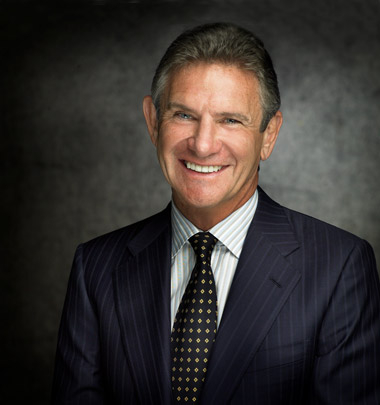Craig Hall
Class of 2007
- Chairman and Founder Hall Group

When people do what is right and not easy, that opens the door to success.
Craig Hall was born in 1950 in Ann Arbor, Michigan. His father worked in advertising for a camera company and his mother also worked outside the home. He lived with his parents and older brother in a small post-World War II row house. His father never went to college, but during Hall's teenage years, his mother received a degree in art education and later taught school. "Ann Arbor is the home of the University of Michigan and the school dominates life there," says Hall. "My parents were not involved in the school, but the university's liberal attitudes throughout my upbringing had great influence on me."
From birth, Hall had seizures caused by childhood epilepsy. "My earliest memories are from when I was not much more than a toddler waking up in the hospital after having had a seizure," he says. At the age of two, Hall was put on phenobarbital, a drug used to treat seizures. Even though it controlled his epilepsy, the drug acted as a depressant and had a devastating effect on his childhood development.
Soon after starting school, it became clear that Hall would have academic problems. He had a difficult time learning to read, and soon he became the class clown. Later, when classes became too difficult, he began skipping school. "The phenobarbital dulled me both mentally and physically," he says. "There were woods near my school and I would go there to just sit and think. The drug dulled me so much I didn't have many friends. I was a loner throughout my childhood and suffered from low self-esteem. Yet despite all of my challenges, I believed that with hard work, in time, I could be successful. I also believed that one day I would be able to help others and that was always important to me."
By the time he was 10, Hall decided the one thing he could do well was work. "I wanted to show my family and the world that I could be successful at something," he says. His business ventures began when a local drug store was going out of business. Hall bought the store's remaining syrup for Green Rivers soda and sold the drink throughout his neighborhood.
Hall was taken off phenobarbital when he was 13. He grew physically and was better able to concentrate on his studies. He started a lawn mowing business, but he went further with it than did most boys his age by hiring his older brother and his friends, so that he could manage a larger clientele. Hall also worked as a dishwasher and night watchman.
By age 17, he had saved $4,000. He graduated from high school and was accepted at Eastern Michigan University, but he later transferred to the University of Michigan and, used his entire savings as a down payment on a rooming house in Ann Arbor. It was a volatile time marked by student-tenant rent strikes, and Hall's goal was to provide the quality service sought by the tenants while making a fair profit. Throughout this time, he continued to save as much money as he could. "When I was in college," he says, "I ate mashed potatoes and gravy every day for months because it cost only 15 cents and was very filling. I could've afforded to buy more food, but that would mean I would save less."
During his junior year, his real estate business was growing, but it required cash to cover operations. In addition to being a full-time student, he was working full time at University Hospital installing heavy equipment, and he had another job working with the county road crew to fund the business. By age 21, Hall owned more than 20 buildings, was one of the largest area landlords, and had become a millionaire on paper.
As a result of the demands of his business, Hall left school in 1970. In his 20s and early 30s, business was booming. At age 27, he wrote his first book and started his first foundation. His business continued to grow, and in 1983, he moved his company to Dallas. By the time he was 35, he had $4 billion in assets and a part-ownership of the Dallas Cowboys.
But the mid-1980s savings and loan crisis and other economic fluctuations had a huge negative effect on Hall's real estate holdings. All at once, lenders and others wanted their money back immediately, and Hall entered a lengthy period fighting for the survival of his business. "The one thing I knew was that I would not compromise my values to save the company," he says. He decided that rather than abandon his investors by claiming bankruptcy, he would sell his own personal assets. He sold off stocks, his portfolio of bonds, his stake in the Cowboys, and other assets, ultimately raising $175 million and contributing it to help his investors. He worked 18-hour days for eight months to restructure a $1 billion debt, but the company continued to experience difficulties for several years more. In the end, however, he helped his investors and survived the crisis.
Hall Financial Group's net worth grew to exceed $750 million, with more than $500 million in liquid investments. Hall's businesses include a finance company, a software company, several thousand apartment units, two wineries, 3,400 acres of land and vineyards in Napa Valley, an office in Texas three million square feet, two hotels in Paris, and numerous venture capital investments. With other investors, Hall controls more than 500,000 acres of oil and gas production land. He is also the largest non-institutional shareholder of American Airlines.
Hall says his business crisis strengthened him. "Failures are the best learning experiences we have," he says. "For me, ethics and success are intertwined. When people do what is right and not easy, that opens the door to success."
